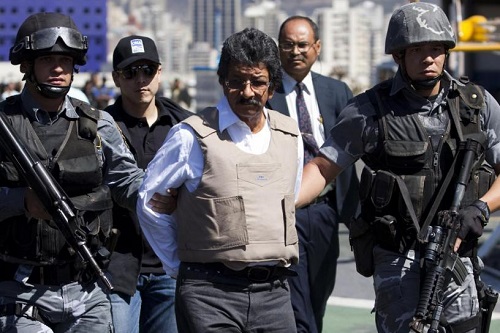Reuters photo
By
Ricardo Swire
Drug trafficking case studies of Colombia and Venezuela illuminate harmful effects of the mafia on the relationship between political power and social order.
Notorious underworld characters clandestinely extract national income and impose divergent policies on peripheral society spaces such as politics. This objective makes the mafia a state rival. Drug trafficking syndicates’ coercive power has been able to infiltrate and regulate society. Criminal organization’s existence challenge the “Weberian” or “Three Component” theory of a state’s representation and its monopoly on intimidation.
Trends stereotype Colombia and Venezuela as oligopolies of coercion. In both neighboring states several organizations have simultaneous and overlapping control of resources that regulate societal transactions. In July 2014 Caracas based political powers pressured authorities on Aruba not to extradite a former Venezuelan Military Intelligence Chief to America. He was wanted on drug trafficking and money laundering charges. The top ranker’s arrest on the Caribbean island came via a request from Washington.
Recently a Venezuelan Army Captain, with strong links to his country’s President, was extradited home from Colombia. The pilot was charged by US Drug Enforcement Administration (DEA) Special Agents with trafficking cocaine to America. In December 2016 high-level Venezuelan government envoys tried fervently to persuade Colombian equals not to extradite the Army Captain to America. During the Colombian Defence Minister’s visit to Caracas the Captain’s potential extradition was broached.
Regional intelligence suggested the military pilot was a “Cartel of the Suns” emissary. He worked with other high ranking officers and related directly to key transnational drug syndicate figures. Cartel of the Suns is a powerful shadowy Venezuelan military drug trafficking consortium. Most members are ranked Generals in the country’s Armed Forces. The phantom clan’s lower ranking rogue National Guardsman representatives jostle for assignments at Venezuela/Colombia border checkpoints to receive payola for “illicit trade.” One convicted drug trafficker testified that Cartel of the Suns agents dispatched five drug flights daily from Apure.
On June 24, 2017 the recently detained Captain was hustled aboard an aircraft, on this occasion transported from Venezuela to America to legally defend against the DEA’s criminal charges. US Federal Agents attested the thirty-six year old senior Venezuelan military officer stole confidential air traffic codes which allowed drug planes’ transponders to mimic legitimate commercial flights, when detected on radar systems. The Captain coordinated more than one hundred drug flights, from Venezuela to Central America and the Caribbean.
Cocaine consignments were delivered to the island of Hispaniola, divided between Haiti and the Dominican Republic (DR). In 2015 one surveilled narco-flight navigated from Apure, located in the Venezuela/Colombia border region, carrying one thousand six hundred kilos of cocaine destined for Honduras. Prior to the Venezuelan military pilot’s June 2016 arrest in Colombia he was assigned to the country’s first lady. Her “narco nephews,” previously caught in a DEA sting, also face a US court on drugs trafficking and money laundering charges.
National Police of Colombia’s Counter-Narcotics Unit officers reported that prior to the Venezuelan pilot’s detention he visited Colombia and interacted with criminal powerhouse Clan Usuga, also known as the Urabenos paramilitary mafia. In February 2015 Colombia Armed Forces assets launched Operation Agamenon, an offensive that probed the Urabenos cartel’s stronghold in the Caribbean Uraba district. Military helicopters supported law enforcement teams on the ground that enveloped the Urabenos’ main launch-pad for cocaine shipments.
In June 2016 the suspect Venezuelan Armed Forces Captain was detained by Colombian law enforcers, after agencies in one hundred and ninety countries were notified by a “Red Notice,” communicated across INTERPOL’s network. The apprehension announcement strategically released after the Captain departed Venezuela. Effects of the mafia on relationships between political powers and social order were again projected in Venezuela’s Walid Makled case.
The drug trafficker, also arrested in Colombia, faced both American and Venezuelan extradition warrants. Colombia chose to deport the Venezuelan to Caracas instead of Washington. Colombian diplomats reasoned Venezuela filed for the trafficker’s extradition first. Political powers’ added motivation was murder is regarded a more serious crime than drugs trafficking. Venezuela reciprocated by automatically deporting Colombian guerillas. The next-door neighbor also absolved trade debt worth hundreds of millions of dollars.
Ricardo Swire
Ricardo Swire is the Principal Consultant at R-L-H Security Consultants & Business Support Services and writes on a number of important issues.



No Comments Yet!
You can be first to comment this post!